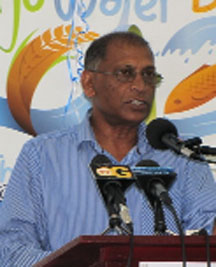As Suriname prepares to boost its Coastguard to tackle illegal and unsustainable fishing in its fishing zone Guyana’s Agriculture Minister, Dr Leslie Ramsammy, yesterday welcomed the idea of having a Fisheries Agreement to help manage the industry regarded as the economic lifeline of nationals of the two countries.
Referring to an article in yesterday’s edition of the Suriname de Ware Tijd newspaper, which stated that SR$80 million had been allocated in that country’s budget to aid its Coastguard in going after Guyanese and other fishermen who are engaged in illegal and unsustainable fishing practices, Ramsammy said he looks forward for a joint fishing agreement between the two countries. “I had met with their Minister of Agriculture and Fisheries, Hendrik Setrowidjojo, and we agreed we need a fisheries agreement for the two countries… I don’t see what they are doing now in regularising their sector as a big problem for us because safe practices are also required by Guyana,” Ramsammy said.

The article also stated that a letter was sent to Ramsammy “informing him that Suriname will conduct a ‘no-nonsense’ policy to protect its fishing grounds against illegal fishing and piracy” the article said. “It is well-known that many Guyanese fishermen are active here, whether legal, illegal or in a grey zone. We have stated in the letter that illegal fishermen will be brought in. Those fishing in Surinamese territorial waters with a Surinamese permit will be registered as well,” the article quotes LVV official Gerrit Breinburg as saying.
Ramsammy said it was not “new news” that persons were fishing illegally in Suriname waters and it was the same problem Guyana faces.
“We have to get structure to stop not only illegal fishing but ensure guidelines and laws are not breached.”
He informed the countries’ presidents had spoken and are still addressing a number of bilateral issues, including the fishing sector.
The article stated that Suriname “will allow a limited number of Guyanese vessels and will include guidelines for the types of vessels, catching methods and the delivery of fish in both countries.”
Ramsammy said while he knows that there has to be a limited number in keeping with “global standards aimed at addressing the depletion of fish stock” his ministry be monitoring the situation carefully. He said there should be another meeting in the coming months.
Meanwhile, he urged local fishermen to comply with regulations. He said his ministry still had a problem getting vessels to register. He reiterated that while there are over 2,000 fishing vessels only a third had registered making monitoring difficult. He said as security was a current issue not having updated data on the number of vessels posed as they could be robbed, get lost, or disappear without the knowledge of the authorities.





